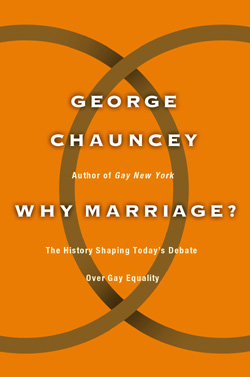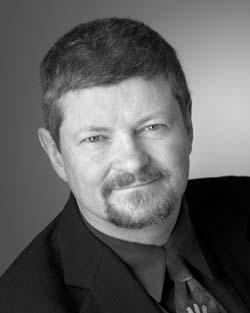
|
|
|
|
Why Marriage? Talking with Author George Chauncey |
|
 George Chauncey is the Professor of American History at The University of Chicago and the author of the Lambda Award winning historical opus Gay New York. Currently he is working intently on the voluminous follow up to that groundbreaking work, The Strange Case of the Closet.
George Chauncey is the Professor of American History at The University of Chicago and the author of the Lambda Award winning historical opus Gay New York. Currently he is working intently on the voluminous follow up to that groundbreaking work, The Strange Case of the Closet.
When his editor at Basic Books approached him to take a break from working on that sequel and write a book about the gay marriage issue he thought about it briefly before deciding "it was an important time to write something that might serve as a kind of intervention in the debate and help put it in perspective." We should all be thankful he made that decision. The result is the recently released and absolutely amazing work, Why Marriage?, a historically based exploration of the issues surrounding same sex marriage featuring a myriad of interesting points and surprising revelations about the debate. It makes for fascinating reading…and the man himself was just as interesting when we discussed his book and the same sex marriage issue. Owen Keehnen: What distinguishes your book, Why Marriage?, from the other gay marriage books on the shelf? George Chauncey: Well, it really tries to put the debate over gay marriage in the context of the much larger debate over gay equality in American society. So it begins with recounting the history of discrimination that people faced just a few decades ago which is a history that's almost entirely forgotten now. I've been surprised that some state legislators and reporters I've talked to don't know that gay people were kept from being served in bars or restaurants or fired in massive numbers from the federal government, or that the discussion of gay issues in Hollywood was forbidden just a few decades ago. So for starters I thought it was important to remind people of that history and then to try and talk about how we got from that point to the point where the issue of gay marriage is suddenly front and center on the national agenda, which would have really been almost unimaginable 20 years ago. So the book is certainly about the marriage issue but I hope it will also be useful for people who are involved in work for gay rights in trying to understand the dramatic emergence of gay visibility and issues in the past decade. Owen Keehnen: I found it fascinating to learn in your book how much of this anti-gay and lesbian legislation was put into place relatively recently, mostly in the 1920s-1950s. George Chauncey: It's really dangerous and it hurts us that we are so unfamiliar with this history because the opponents of gay rights and certainly same sex marriage like to claim that history is on their side and that discrimination and hostility against gay people is age old. It's important to note there's been a long history in the regulation of sexual acts of various kinds, not just homosexual acts but many acts that happily married heterosexual couples engage in as well. The history of the systematic discrimination of gay people on the basis of their status as homosexuals is really a product of the 20th century. Most of it was put in place between the 1920s and 1950s and most was dismantled between the 1960s and the 1990s so that the right wing is simply wrong when it calls on its theories of millennium world teaching against gay people. Owen Keehnen: Another fascinating part of your book discusses the lessons that our movement has and can learn from the Black Civil Rights movement of the 1950s and 1960s.
Owen Keehnen: It's extremely powerful when you draw comparisons between interracial marriage and even interfaith marriages. George Chauncey: The opponents of same sex marriage often like to say that marriage has always been a religious institution so maybe you can allow people to have domestic partnerships, maybe you can allow them to have civil unions, but protect marriage as a religious institution. But in fact, marriage since The Revolution in this country has never been a religious institution. It has always been a civil institution. Whether or not you have it religiously sanctioned that's your choice, but if you want to be married that is a civil procedure. One of the clearest ways we see this is the churches have not been able to control interfaith marriages. Both The Catholic Church and many Protestant churches worked very hard to keep people of their faith from marrying people of another faith and they imposed all sorts of church sanctions, especially in The Catholic Church, but they couldn't keep people from getting married because marriage was a civil institution. And this just gets erased when we don't look at the history of marriage as an institution. Owen Keehnen: So what factors prompted this seemingly sudden push for gay marriage? George Chauncey: Marriage has always been a contentious issue within the gay movement. Many people have been opposed to pursuing marriage rights for a variety of reasons though it's also important to note that even many early gay liberation activists thought gay people should have access to marriage like they should be able to do anything else that heterosexuals do. But clearly, the terrible impact of AIDS on people and the way it confronted people with the fact that all sorts of powerful institutions did not recognize their relationships - hospitals, funeral homes, insurance companies, and so forth. All that really brought home to people how vulnerable our relationships were. Also the lesbian baby boom did too. People want to provide as much security to their children as possible and it's very difficult to do if the relationship of the two mothers or the two fathers is not recognized. So this sort of searing mass experience of death and childbirth in the 1980s and 90s really made many of us think much more seriously about marriage. But I am also interested in looking at the history of the opposition to the same sex marriage campaign. It's clear that the opponents of same sex marriage are the same people who have opposed every advancement of gay rights be it domestic partnership or increased gay visibility in the media. Even though they often claim they respect gay people and their relationships and they just want to save marriage for heterosexuals, they have in fact opposed gay people in every stage of the game. They are also the people who are most opposed to changes in marriage in heterosexuals as well. Part of what I try to do in this book is show how marriage itself has changed as an institution for heterosexuals. The old strict division of labor between husbands and wives has given way in the past century and especially the last several decades so that roles aren't just prescribed to people the way they used to be - which makes it easier to imagine people of the same sex getting married. Also for many of the opponents of same sex marriage this is an important source of their hostility to all changes in gender relations between men and women. Owen Keehnen: You make so many great points in this book, I think it's important to remind people of the religious right's past stances on progressive issues and marriage…like this quote you include from Jerry Falwell from a 1958 sermon saying that integration would ultimately, "destroy our race. If we mix the races in schools, in churches, the ultimate end will be the social mixing that can only lead to marital relationships." George Chauncey: People forget that just a few decades ago the white southern Christians opposed interracial marriage and integration with the same sincere religious conviction and moral fervor that they oppose same sex marriage today. So they are calling on the infallible and timeless authority of God to support positions that are very fallible and historically specific. And so long as we don't see this history we'll never be able to use this argument against them. Owen Keehnen: So what do you think same sex marriage activists should focus their energies on to help the cause? George Chauncey: In many ways I think the right wing will win so long as they keep it as an abstract issue and somehow present giving gay couples access to marriage as undermining marriage for everyone else. That of course is an absurd argument. It's important for us to tell what happens to real life individuals who suddenly can't get access to their partner in a medical emergency or who can't provide insurance for the children they are raising with their partner. These are the stories that are compelling to people and these are indeed some of the important reasons that we want access to gay marriage rights. Owen Keehnen: So you and your partner Ron have been together for 10 years, did writing this book make you want to tie-the-knot? George Chauncey: (Laughs). You know, we'll have to think about it again when full marriage equality is available including all of the federal protections and rights and benefits. I think many of us think about marriage not just because of the symbolic affirmation it provides, but I think all of us in long term committed relationships want to be able to protect our partners as much as we can and marriage does provide a whole range of protections and rights that no other group of documents can possibly replicate. Owen Keehnen: Thanks George and congrats on the success of your book Why Marriage? |
|
 Author George Chauncey
Author George Chauncey